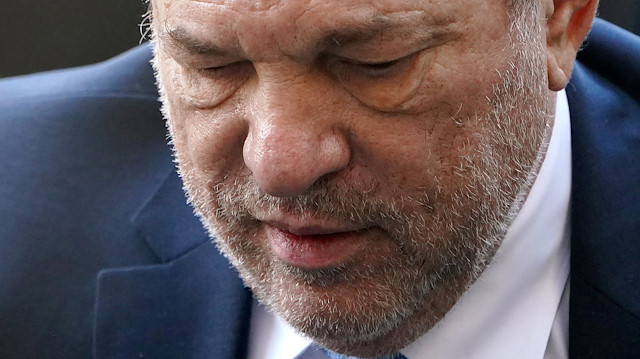

Film producer Harvey Weinstein arrives at the New York Criminal Court
Former movie producer Harvey Weinstein, whose sexual assault conviction last month was hailed as a victory for the #MeToo movement against sexual misconduct by powerful men, is expected to be sentenced at a criminal court in Manhattan on Wednesday.
Once one of Hollywood's most influential producers, Weinstein, 67, faces a maximum sentence of 29 years in prison, after a jury on Feb. 24 found him guilty of sexually assaulting former production assistant Mimi Haleyi and raping former aspiring actress Jessica Mann.
Both women are expected to speak at Weinstein's sentencing.
Prosecutors in court filings last week did not say whether they would seek the maximum, but said the sentence should reflect not only the crimes of which he was convicted, but a "lifetime of abuse towards others."
More than 100 women, including famous actresses, have accused Weinstein of sexual misconduct stretching back decades, fueling the #MeToo movement against sexual abuse and harassment. He has denied the allegations and said that any sex was consensual.
"He has consistently advanced his own sordid desires and fixations over the well-being of others," prosecutors wrote of Weinstein. "He has destroyed people's lives and livelihoods or threatened to do so on whim."
Weinstein's lawyers on Monday urged Justice James Burke to impose the minimum sentence of five years, asking him to consider Weinstein's charitable activities and saying a longer sentence would likely mean Weinstein would die in prison.
"His life story, his accomplishments, and struggles are simply remarkable and should not be disregarded in total because of the jury's verdict," they said.
The former producer has been awaiting sentencing in New York's Rikers Island jail, where he was moved last Thursday after a 10-day hospital stay at Bellevue Hospital where he underwent a procedure to clear a heart blockage.
Prosecutors portrayed Weinstein as a serial predator who had manipulated women with promises to open doors in Hollywood, coaxing them to hotel rooms or private apartments and then overpowering and violently attacking them.
Haleyi testified at the trial that, in 2006, Weinstein invited her to his home after she had worked on one of his television productions, backed her into a bedroom, held her down on the bed and forced himself on her orally.
Mann told jurors that Weinstein raped her in a Manhattan hotel room in March 2013, about a month into what she described as an "extremely degrading" relationship with him, which continued for several years after the attack. Mann described Weinstein as a "Jekyll and Hyde" character, charming in public but prone to rage when they were alone.
The jury of seven men and five women acquitted Weinstein on the most serious charges, which carried a potential life sentence. Those charges relied on testimony by actress Annabella Sciorra, who said Weinstein raped her in the early 1990s.
In addition to Haleyi, Mann and Sciorra, prosecutors called three more women to testify against Weinstein. Each told a similar story of Weinstein luring them into private places with promises to open doors in Hollywood and then attacking them.
Weinstein's lawyers argued during the trial that the women were reframing consensual encounters as assaults out of regret. They zeroed in on friendly messages and ongoing contact between the women and Weinstein after the alleged attacks.
In Friday's filing, prosecutors listed more than a dozen accusations going back to 1978, when they said he sexually assaulted an employee of his Buffalo, New York-based music company in a hotel room. The prosecutors argued Justice Burke should consider the alleged incidents even though they were never criminally charged.
They also accused Weinstein of verbally and physically abusive behavior in the workplace dating back to the 1990s.
Weinstein's lawyers said in their filing on Monday that the additional allegations should play no role in the sentence.
#Weinstein
#Trial

